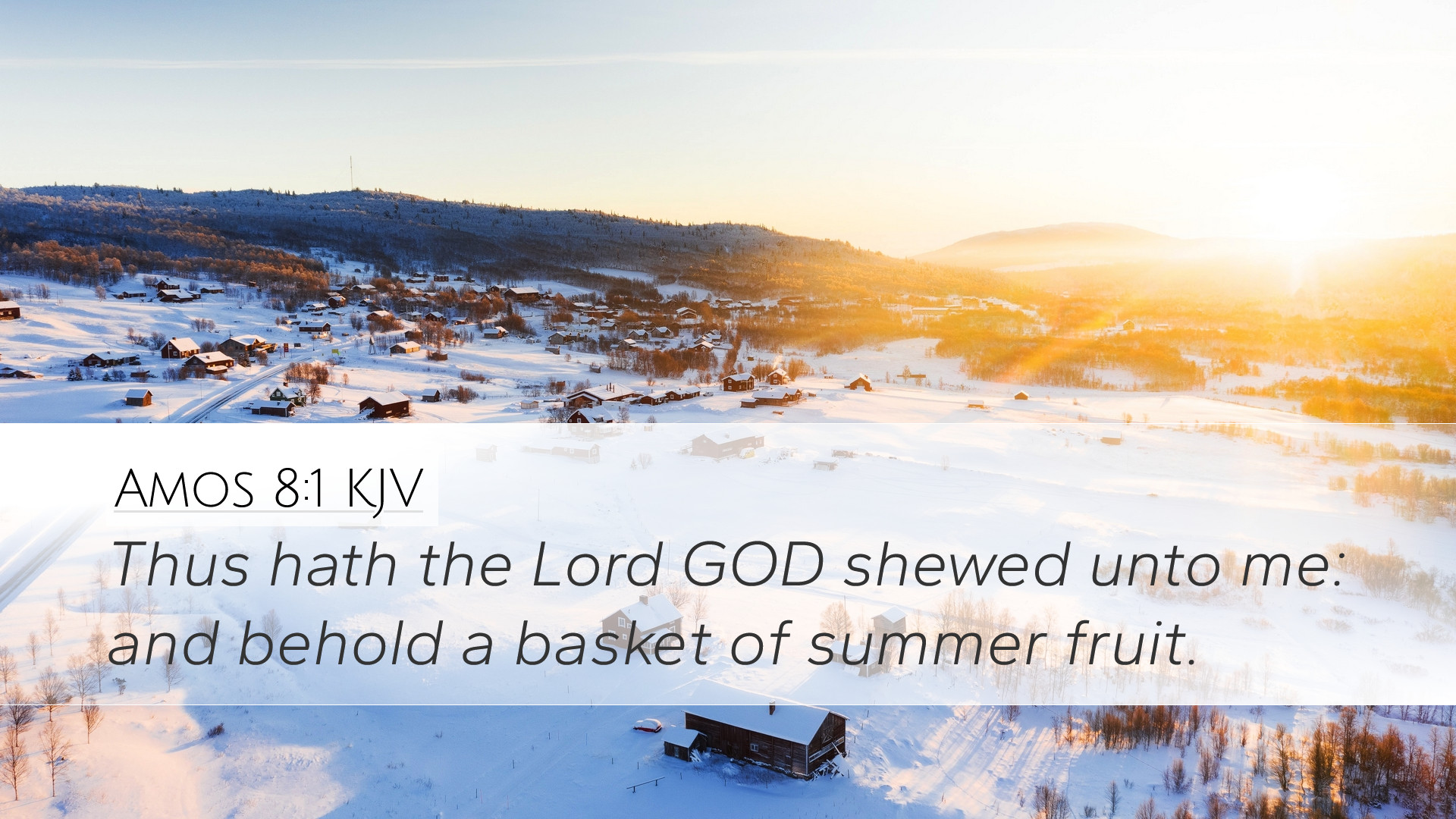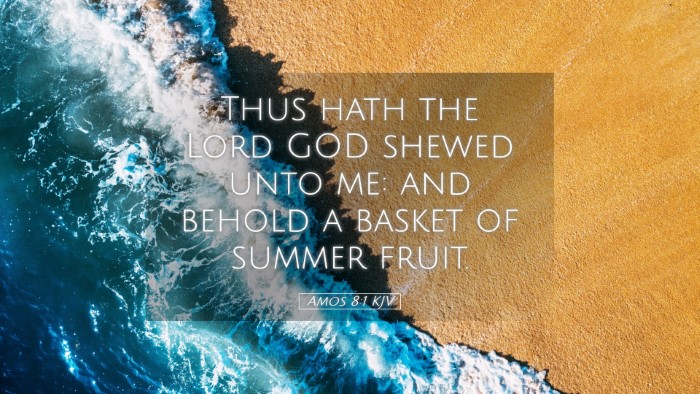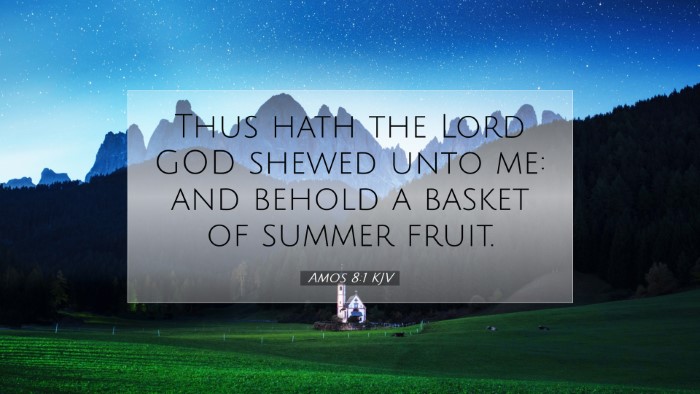Old Testament
Genesis Exodus Leviticus Numbers Deuteronomy Joshua Judges Ruth 1 Samuel 2 Samuel 1 Kings 2 Kings 1 Chronicles 2 Chronicles Ezra Nehemiah Esther Job Psalms Proverbs Ecclesiastes Song of Solomon Isaiah Jeremiah Lamentations Ezekiel Daniel Hosea Joel Amos Obadiah Jonah Micah Nahum Habakkuk Zephaniah Haggai Zechariah MalachiAmos 8:1
Amos 8:1 KJV
Thus hath the Lord GOD shewed unto me: and behold a basket of summer fruit.
Amos 8:1 Bible Commentary
Commentary on Amos 8:1
Bible Verse: "This is what the Lord showed me: a basket of ripe fruit." (Amos 8:1, NIV)
Introduction
The book of Amos, a profound prophetic work, emerges as a powerful voice of social justice and divine judgment against the northern kingdom of Israel. This verse opens a vision given to Amos, illustrating the impending judgment of God. The symbolism of ripe fruit is a cornerstone in understanding the divine message conveyed through this passage.
Contextual Background
Amos, a shepherd called to prophesy in Israel during a period of prosperity, witnessed the moral decay of society characterized by exploitation, idolatry, and corruption among both the elite and common people. His prophecies reflect not only imminent judgment but also a plea for justice and righteousness.
Amos 8 serves as a pivotal chapter that contrasts the apparent stability of Israel with the reality of divine judgment. The vision of ripe fruit symbolizes the culmination of God’s patience and the readiness for judgment.
Insight from Matthew Henry
Matthew Henry emphasizes the metaphor of the ripe fruit representing the maturity of Israel's sins. He points out that just as ripe fruit signifies the end of the growing season, so too does this vision predict the end of God's forbearance with Israel’s iniquities. Henry notes that the "basket" signifies a complete and comprehensive judgement—nothing shall be left behind. He challenges readers to reflect on their spiritual state, urging awareness of sins before they come to fruition in judgment.
Albert Barnes' Perspective
Albert Barnes elaborates on the significance of the 'basket' and 'ripe fruit.' He argues that the 'ripe fruit' illustrates a nation whose transgressions have reached their peak—there is no longer the possibility of repentance. Barnes sees this as a direct communication of God’s impending judgment due to a lack of righteous deeds among the people. The use of agricultural imagery resonates with an agrarian society, reflecting their daily lives and exposing the urgency of the call to repentance.
Adam Clarke's Commentary
Adam Clarke provides an in-depth analysis of the symbolism in this verse, articulating that the ripe fruit symbolizes the people of Israel—their prosperity, successes, and sinful nature. Clarke explains that the basket represents divine surveillance over their actions. He emphasizes that just as fruit is collected when ripe, so shall God’s judgment be executed at the appropriate time. Clarke’s reflections serve as a reminder of both the mercy of God and the serious consequences of forsaking covenantal obligations.
Theological Implications
- Judgment and Accountability: The vision of ripe fruit echoes the concept that all actions have consequences. The maturity of sin calls for acknowledgment and repentance.
- God’s Patience: The imagery suggests a waiting period where God's mercy has been extended. The time for repentance has diminished, reflecting the theme of divine patience not lasting indefinitely.
- Social Justice: Amos’s message is intertwined with a call for social justice, warning that exploitation of the poor and corrupt practices will trigger divine judgment.
- The Finality of Judgment: The collection of ripe fruit illustrates the approaching climax of God’s judgment, underscoring the finality of divine verdicts against nations and individuals alike.
Application for Today
The message of Amos 8:1 extends beyond its historical context into contemporary relevance. Pastors, theologians, and scholars are called to examine their communities and personal lives in light of this prophetic warning. The maturity of one’s spiritual life, the actions taken toward justice, and the cultivation of righteousness are imperative. The church today must heed the lessons of accountability and social responsibility, ensuring that the urgent call for justice is actively pursued.
Moreover, it serves as a sobering reminder to the faithful to remain vigilant against complacency in their spiritual journey, recognizing that God’s patience is a gift that should inspire diligence rather than indifference.
Conclusion
Amos 8:1 is more than just a prophetic message for ancient Israel; it speaks profoundly into the conscience of modern believers. The imagery of a basket of ripe fruit captures the urgency of repentance, the finality of judgment, and the divine call for justice. As we reflect upon this scripture, we are reminded of our roles as agents of change, striving for a society that upholds righteousness in all our dealings.


